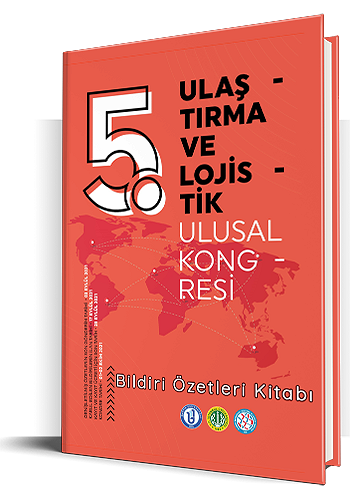
Ulaştırma ve Lojistik Kongreleri
- Türkçe
- Özet
- 2021
Planlı Davranış Teorisi Çerçevesinde Kargomat Sisteminin İncelenmesi: Elektronik Son Adım Teslimatının E- Ticaret Platformları Üzerine Bir Araştırması
Yavuz Toraman
Arş. Gör., Nişantaşı Üniversitesi, İstanbul, Türkiye
Teknolojik gelişimini sürdürürken her gün yeni bir teknoloji insan hayatına girmektedir. İnsan hayatını yakından etkileyen teknolojinin değişimi ve gelişim süreci uzmanlar tarafından merak konusu olmuştur. Akademik alanda da birçok çalış gerçekleştirilmiştir. Sosyal psikologlar tarafından işlenen Gerekçeli Eylem Teorisi (GET) insan davranışlarının anlaşılmasında bir basamak olarak kullanılmıştır. Araştırma özelinde ise Gerekçeli Eylem Teorisinin modernize edilmiş farklı bir yöntemi olan Planlı Davranış Teorisi (PDT) çerçevesinde yeni teknolojilerin kabulü incelenecektir. PDT, algılanan davranışsal kontrol, davranışsal tutum ve öznel norm ilişkisinin niyeti dolayısıyla davranışı etkilediğini savunmaktadır (Ajzen, 1991). Araştırmada PDT’nin orijinal modeli kullanılmıştır. Dijitalleşmenin insan hayatına çok farklı noktada temas etmesiyle birlikte yeniliklerin tüketiciler tarafından algılanması uzmanlar tarafından süreç içerisinde merak konusu olmuştur. Bu bağlamda tüketicilerin yeni teknolojileri kabulünü etkileyen faktörlerin incelenmesi araştırmanın temel problemini oluşturmaktadır. Araştırmada tüketicilerin kullanımına sunulan kargo otomatı (kargomat) sistemi incelenmiştir. Kargomatlar son adım teslimatı (last mile delivery) şekillerinden olup, ilerleyen süreçte e-son adım teslimat olarak adlandırılabileceği düşünülmektedir. Kargomat teknolojisi, tüketici tarafından satın alınan ürünün herhangi bir üçüncü kişiye ihtiyaç duyulmaksızın 7/24 teslim alınabilmesine olanak sağlayan kargo teslimatını yapan makinelerdir. Sıklıkla e-ticaret platformlarının ürün teslimatında geleneksel son adım teslimat yöntemlerine ek olarak kullanılan teslimat şekillerinden birisidir. Kargomatlar perakendeci veya e-ticaret platformları tarafından nihai tüketiciye verilen şifrenin sistemlerine girilmesi ile birlikte ürünün bulunduğu kapalı bölmenin kapağının otomatik olarak açılmasıyla ürünün teslimatını gerçekleştirir. E-ticaret platformunun gönderdiği kod ile tüketici ürünü temassız bir şekilde alabilecektir. Bu bağlamda tüketicilerin elektronik platformlardan yaptıkları alışveriş deneyimlerinin bir parçası haline gelmekte olan ve ilerleyen süreçte de kullanım alanlarının artışıyla birlikte kullanıcı sayısının da artışına bağlı olarak alışverişin deneyiminin bir parçası olacağı öngörülen kargomatlara karşı tüketicilerin tutum, niyet ve davranışlarını etkileyen faktörler Planlı Davranış Teorisi çerçevesinde incelenerek analiz edilmiştir. Bu durum çalışmanın temel problemini oluşturmaktadır. Çalışmanın konusuna ve içeriğine uygun olarak araştırmanın ana kütlesi akıllı cihaz kullanan kişilerden oluşmaktadır. Araştırmanın ana kütlesine 18 yaş ve üzeri bireyler dahil edilmiştir. Elektronik ticaret platformlarının ve elektronik ticaretin yoğunluğu İstanbul ili özelinde olması nedeniyle çalışma İstanbul iliyle sınırlandırılmıştır. Çalışmanın örneklemi, tesadüfi olmayan örnekleme yöntemlerinden kolayda örneklemedir. Çalışmanın örneklemi kullanıcılardan yalnızca ulaşılabilir olanların araştırmaya dahil edildiği kolayda örnekleme yöntemiyle gerçekleştirilmiştir (Kurtuluş, 2010). Çalışma İstanbul içinde gerçekleştirilmiştir. Çalışmaya 165 kişi katılmış olup anketler detaylı olarak incelendiğinde analize uygun olmayan anketler ayırıldığında 149 kişiden alınan kullanılabilir veriyle araştırmanın analizi yapılmıştır. Hazırlanan araştırma anketi Google Formlar aracılığı ile 15.08.2021-04.09.2021 tarihleri arasında uygulanmıştır. Literatürde PDT kapsamında yapılan farklı çalışmalar incelenmiştir. Çalışmada literatüre paralel olarak bağımlı ve bağımsız değişkenler arasındaki karmaşık ilişkiyi daha net görebilmek adına yapısal eşitlik modellemesi (YEM) kullanılmıştır (Hair vd., 2010). Çalışmanın değişkenlerinin Faktör Yükleri, Kompozit Güvenirlikleri, AVE değerleri ve Crobbach’s Alpha değerleri beklenen değerler aralığında olduğu gözlemlenmiştir. Smart PLS 3 programı yol analizi yapılmıştır. Analiz sonucunda tüketicilerin kargomat kullanma niyetlerinin ve davranışlarının, tutum ile öznel normlardan etkilendiği tespit edilmiştir. Çalışmaya ait H4 hipotezi reddedilirken diğerleri kabul edilmiştir. Literatürde Planlı Davranış Teorisi çerçevesinde yeni bir teknoloji olan kargomatların kullanıcı kabulünü etkileyen faktörlerin incelenmesi içeren araştırmalara pek rastlanmamıştır. Söz konusu çalışma bu alanda keşfedici bir çalışma olmuş olup literatüre mütevazı bir katkı sağlaması beklenmektedir. Kargomat kullanımı arttıkça bu konudaki çalışmalarında artacağı düşünülmektedir. Teknolojinin sağladığı fayda ile kargomatlar son adım teslimatı sürecine elektronik son adım teslimatı adıyla alt başlık açabileceği öngörülmektedir.
Anahtar Kelimeler: Planlı Davranış Teorisi (PDT), E-Son Adım Teslimatı, Lojistik, Son Adım Teslimatı, E-Ticaret
Investigation of Locker System in the Framework of Planned Behavior Theory: A Study of Electronic Last Mile Delivery on E-Commerce Platforms
As technological developments continue, a new technology enters human life every day. The change and development process of technology, which closely affects human life, has been the subject of curiosity by experts. Many studies have also been carried out in the academic field in this field. Reasoned Action Theory (RAT), processed by social psychologists, has been used as a stepping stone in understanding human behavior. In particular, the acceptance of new technologies will be examined within the framework of Planned Behavior Theory (PBT), which is a modernized and different method of Reasoned Action Theory. PBT argues that the relationship between perceived behavioral control, attitude toward the behavior and subjective norm affects behavior through intention. (Ajzen, 1991). The original model of PBT was used in the study. As digitalization touches human life at many different points, the perception of innovations by consumers has been a matter of curiosity by experts in the process. In this context, examining the factors affecting the acceptance of new technologies by consumers constitutes the main problem of the research. In the research, the locker system offered to consumers was examined. ‘‘Locker’’ is one of the last mile delivery forms, and it is thought that it can be called e-last mile delivery in the future. Locker technology is the machines that deliver cargo that allows the product purchased by the consumer to be received 24/7 without the need for any third party. It is one of the delivery methods that is often used in addition to the traditional last mile delivery methods in the product delivery of e-commerce platforms. Locker delivers the product by automatically opening the cover of the closed compartment where the product is located, after entering the password given to the final consumer by the retailer or e-commerce platforms. With the code sent by the e-commerce platform, the consumer will be able to receive the product contactless. In this context, it becomes a part of the shopping experiences of consumers on electronic platforms. In the future, due to the increase in the number of users with the increase in usage areas, locker that are expected to be a part of the shopping experience. The factors affecting the attitudes, intentions and behaviors of consumers towards locker were analyzed within the framework of Planned Behavior Theory. It constitutes the main problem of the study. In accordance with the subject and content of the study, the main mass of the research consists of people using smart devices. Individuals aged 18 and over were included in the main population of the study. Since the density of electronic commerce platforms and electronic commerce is specific to the province of Istanbul, the study is limited to the province of Istanbul. The sample of the study is convenience sampling, one of the non-random sampling methods. The sample of the study was carried out by convenience sampling method, in which only the accessible users were included in the research (Kurtuluş, 2010). The study was carried out in Istanbul. 165 people participated in the study. When the questionnaires were examined in detail, when the questionnaires that were not suitable for the analysis were separated, the analysis of the research was made with the available data from 149 people. The prepared research questionnaire was applied between 15.08.2021 and 04.09.2021 via Google Forms. In the literature, different studies conducted within the scope of PBT have been examined. In the study, in parallel with the literature, structural equation modeling (SEM) was used in order to see the complex relationship between dependent and independent variables more clearly (Hair vd., 2010). Factor Loads, Composite Reliability, AVE values and Crobbach's Alpha values of the variables of the study were observed to be within the expected range. Smart PLS 3 program path analysis was done. As a result of the analysis, it has been determined that the intentions and behaviors of consumers to use Locker are affected by attitude and subjective norms. While the H4 hypothesis of the study was rejected, the others were accepted. In the literature, there are not many studies that examine the factors affecting the user acceptance of Locker, which is a new technology within the framework of Planned Behavior Theory. The study is related is an exploratory study in this field and is expected to make a modest contribution to the literature. It is thought that as the use of Locker increases, the studies on this subject will increase. With the benefit of technology, it is foreseen that the last mile delivery process of locker can be named as of electronic last mile delivery.
Keywords: E-Last Mile Delivery, Logistics, Last Mile Delivery, E-Commerce, Planned Behavior Theory


Bu çalışma, kullanan kişilere orjinal çalışmadan alıntı yaptıkları sürece, çalışmayı dağıtma, değiştirme ve üzerine çalışma hakkı tanıyan Attribution 4.0 International (CC BY 4.0) lisansı ile lisanslanmıştır.
İletişim
İstanbul Üniversitesi Ulaştırma ve Lojistik Fakültesi
İ.Ü. Avcılar Kampüsü 34320 Avcılar/İstanbul
ulk@istanbul.edu.tr
+ 90 (212) 440 00 00 - 19200


